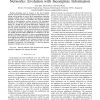15 search results - page 1 / 3 » Satisfaction Equilibrium: Achieving Cooperation in Incomplet... |
AI
2006
Springer
13 years 9 months ago
2006
Springer
So far, most equilibrium concepts in game theory require that the rewards and actions of the other agents are known and/or observed by all agents. However, in real life problems, a...
WCNC
2010
IEEE
13 years 9 months ago
2010
IEEE
—Enabling users to connect to the best available network, dynamic network selection scheme is important for satisfying various quality of service (QoS) requirements, achieving se...
CORR
2010
Springer
13 years 2 months ago
2010
Springer
Power management is one of the vital issue in wireless sensor networks, where the lifetime of the network relies on battery powered nodes. Transmitting at high power reduces the l...
ATAL
2008
Springer
13 years 7 months ago
2008
Springer
In repeated games with incomplete information, rational agents must carefully weigh the tradeoffs of advantageously exploiting their information to achieve a short-term gain versu...
CCS
2009
ACM
14 years 2 days ago
2009
ACM
In mobile networks, authentication is a required primitive of the majority of security protocols. However, an adversary can track the location of mobile nodes by monitoring pseudo...


